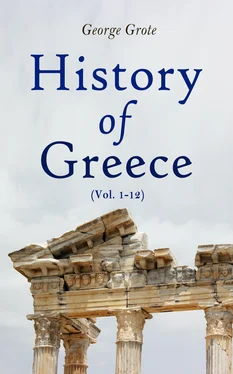George Grote - History of Greece (Vol. 1-12)
Здесь есть возможность читать онлайн «George Grote - History of Greece (Vol. 1-12)» — ознакомительный отрывок электронной книги совершенно бесплатно, а после прочтения отрывка купить полную версию. В некоторых случаях можно слушать аудио, скачать через торрент в формате fb2 и присутствует краткое содержание. Жанр: unrecognised, на английском языке. Описание произведения, (предисловие) а так же отзывы посетителей доступны на портале библиотеки ЛибКат.
- Название:History of Greece (Vol. 1-12)
- Автор:
- Жанр:
- Год:неизвестен
- ISBN:нет данных
- Рейтинг книги:5 / 5. Голосов: 1
-
Избранное:Добавить в избранное
- Отзывы:
-
Ваша оценка:
- 100
- 1
- 2
- 3
- 4
- 5
History of Greece (Vol. 1-12): краткое содержание, описание и аннотация
Предлагаем к чтению аннотацию, описание, краткое содержание или предисловие (зависит от того, что написал сам автор книги «History of Greece (Vol. 1-12)»). Если вы не нашли необходимую информацию о книге — напишите в комментариях, мы постараемся отыскать её.
History of Greece (Vol. 1-12) — читать онлайн ознакомительный отрывок
Ниже представлен текст книги, разбитый по страницам. Система сохранения места последней прочитанной страницы, позволяет с удобством читать онлайн бесплатно книгу «History of Greece (Vol. 1-12)», без необходимости каждый раз заново искать на чём Вы остановились. Поставьте закладку, и сможете в любой момент перейти на страницу, на которой закончили чтение.
Интервал:
Закладка:
The influence of the Thracian religion upon that of the Greeks cannot be traced in detail, but the ceremonies contained in it were of a violent and fierce character, like the Phrygian, and acted upon Hellas in the same general direction as the latter. And the like may be said of the Egyptian religion, which was in this case the more operative, inasmuch as all the intellectual Greeks were naturally attracted to go and visit the wonders on the banks of the Nile; the powerful effect produced upon them is attested by many evidences, but especially by the interesting narrative of Herodotus. Now the Egyptian ceremonies were at once more licentious, and more profuse in the outpouring both of joy and sorrow, than the Greek; 71but a still greater difference sprang from the extraordinary power, separate mode of life, minute observances, and elaborate organization, of the priesthood. The ceremonies of Egypt were multitudinous, but the legends concerning them were framed by the priests, and as a general rule, seemingly, known to the priests alone: at least they were not intended to be publicly talked of, even by pious men. They were “holy stories,” which it was sacrilege publicly to mention, and which from this very prohibition only took firmer hold of the minds of the Greek visitors who heard them. And thus the element of secrecy and mystic silence—foreign to Homer, and only faintly glanced at in Hesiod—if it was not originally derived from Egypt, at least received from thence its greatest stimulus and diffusion. The character of the legends themselves was naturally affected by this change from publicity to secrecy: the secrets when revealed would be such as to justify by their own tenor the interdict on public divulgation: instead of being adapted, like the Homeric mythe, to the universal sympathies and hearty interest of a crowd of hearers, they would derive their impressiveness from the tragical, mournful, extravagant, or terror-striking character of the incidents. 72Such a tendency, which appears explicable and probable even on general grounds, was in this particular case rendered still more certain by the coarse taste of the Egyptian priests. That any recondite doctrine, religious or philosophical, was attached to the mysteries or contained in the holy stories, has never been shown, and is to the last degree improbable though the affirmative has been asserted by many learned men.
Herodotus seems to have believed that the worship and ceremonies of Dionysos generally were derived by the Greeks from Egypt, brought over by Kadmus and taught by him to Melampus: and the latter appears in the Hesiodic Catalogue as having cured the daughters of Prœtus of the mental distemper with which they had been smitten by Dionysos for rejecting his ritual. He cured them by introducing the Bacchic dance and fanatical excitement: this mythical incident is the most ancient mention of the Dionysiac solemnities presented in the same character as they bear in Euripidês. It is the general tendency of Herodotus to apply the theory of derivation from Egypt far too extensively to Grecian institutions: the orgies of Dionysos were not originally borrowed from thence, though they may have been much modified by connection with Egypt as well as with Asia. The remarkable mythe composed by Onomakritus respecting the dismemberment of Zagreus was founded upon an Egyptian tale very similar respecting the body of Osiris, who was supposed to be identical with Dionysos: 73nor was it unsuitable to the reckless fury of the Bacchanals during their state of temporary excitement, which found a still more awful expression in the mythe of Pentheus,—torn in pieces by his own mother Agavê at the head of her companions in the ceremony, as an intruder upon the feminine rites as well as a scoffer at the god. 74A passage in the Iliad (the authenticity of which has been contested, but even as an interpolation it must be old) 75also recounts how Lykurgus was struck blind by Zeus for having chased away with a whip “the nurses of the mad Dionysos,” and frightened the god himself into the sea to take refuge in the arms of Thetis: and the fact, that Dionysos is so frequently represented in his mythes as encountering opposition and punishing the refractory, seems to indicate that his worship under its ecstatic form was a late phænomenon and introduced not without difficulty. The mythical Thracian Orpheus was attached as Eponymos to a new sect, who seem to have celebrated the ceremonies of Dionysos with peculiar care, minuteness and fervor, besides observing various rules in respect to food and clothing. It was the opinion of Herodotus, that these rules, as well as the Pythagorean, were borrowed from Egypt. But whether this be the fact or not, the Orphic brotherhood is itself both an evidence, and a cause, of the increased importance of the worship of Dionysos, which indeed is attested by the great dramatic poets of Athens.
The Homeric Hymns present to us, however, the religious ideas and legends of the Greeks at an earlier period, when the enthusiastic and mystic tendencies had not yet acquired their full development. Though not referable to the same age or to the same author as either the Iliad or the Odyssey, they do to a certain extent continue the same stream of feeling, and the same mythical tone and coloring, as these poems—manifesting but little evidence of Egyptian, Asiatic, or Thracian adulterations. The difference is striking between the god Dionysos as he appears in the Homeric hymn and in the Bacchæ of Euripidês. The hymnographer describes him as standing on the sea-shore, in the guise of a beautiful and richly-clothed youth, when Tyrrhenian pirates suddenly approach: they seize and bind him and drag him on board their vessel. But the bonds which they employ burst spontaneously, and leave the god free. The steersman, perceiving this with affright, points out to his companions that they have unwittingly laid hands on a god,—perhaps Zeus himself, or Apollo, or Poseidôn. He conjures them to desist, and to replace Dionysos respectfully on the shore, lest in his wrath he should visit the ship with wind and hurricane: but the crew deride his scruples, and Dionysos is carried prisoner out to sea with the ship under full sail. Miraculous circumstances soon attest both his presence and his power. Sweet-scented wine is seen to flow spontaneously about the ship, the sail and mast appear adorned with vine and ivy-leaves, and the oar-pegs with garlands. The terrified crew now too late entreat the helmsman to steer his course for the shore, and crowd round him for protection on the poop. But their destruction is at hand: Dionysos assumes the form of a lion—a bear is seen standing near him—this bear rushes with a loud roar upon the captain, while the crew leap overboard in their agony of fright, and are changed into dolphins. There remains none but the discreet and pious steersman, to whom Dionysos addresses words of affectionate encouragement, revealing his name, parentage and dignity. 76
This hymn, perhaps produced at the Naxian festival of Dionysos, and earlier than the time when the dithyrambic chorus became the established mode of singing the praise and glory of that god, is conceived in a spirit totally different from that of the Bacchic Telatæ, or special rites which the Bacchæ of Euripidês so abundantly extol,—rites introduced from Asia by Dionysos himself at the head of a thiasus or troop of enthusiastic women,—inflaming with temporary frenzy the minds of the women of Thebes,—not communicable except to those who approach as pious communicants,—and followed by the most tragical results to all those who fight against the god. 77The Bacchic Teletæ, and the Bacchic feminine frenzy, were importations from abroad, as Euripidês represents them, engrafted upon the joviality of the primitive Greek Dionysia; they were borrowed, in all probability, from more than one source and introduced through more than one channel, the Orphic life or brotherhood being one of the varieties. Strabo ascribes to this latter a Thracian original, considering Orpheus, Musæus, and Eumolpus as having been all Thracians. 78It is curious to observe how, in the Bacchæ of Euripidês, the two distinct and even conflicting ideas of Dionysos come alternately forward; sometimes the old Grecian idea of the jolly and exhilarating god of wine—but more frequently the recent and imported idea of the terrific and irresistible god who unseats the reason, and whose œstrus can only be appeased by a willing, though temporary obedience. In the fanatical impulse which inspired the votaries of the Asiatic Rhea or Cybelê, or of the Thracian Kotys, there was nothing of spontaneous joy; it was a sacred madness, during which the soul appeared to be surrendered to a stimulus from without, and accompanied by preternatural strength and temporary sense of power, 79—altogether distinct from the unrestrained hilarity of the original Dionysia, as we see them in the rural demes of Attica, or in the gay city of Tarentum. There was indeed a side on which the two bore some analogy, inasmuch as, according to the religious point of view of the Greeks, even the spontaneous joy of the vintage feast was conferred by the favor and enlivened by the companionship of Dionysos. It was upon this analogy that the framers of the Bacchic orgies proceeded but they did not the less disfigure the genuine character of the old Grecian Dionysia.
Читать дальшеИнтервал:
Закладка:
Похожие книги на «History of Greece (Vol. 1-12)»
Представляем Вашему вниманию похожие книги на «History of Greece (Vol. 1-12)» списком для выбора. Мы отобрали схожую по названию и смыслу литературу в надежде предоставить читателям больше вариантов отыскать новые, интересные, ещё непрочитанные произведения.
Обсуждение, отзывы о книге «History of Greece (Vol. 1-12)» и просто собственные мнения читателей. Оставьте ваши комментарии, напишите, что Вы думаете о произведении, его смысле или главных героях. Укажите что конкретно понравилось, а что нет, и почему Вы так считаете.












